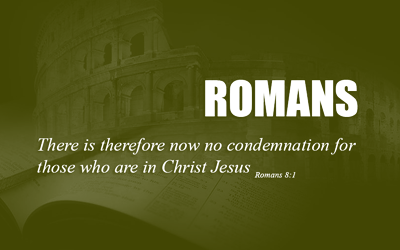Romans Chapter 1
Obedience of faith is the willingness to base one’s salvation entirely on Christ.
(Bấm vào đây để đọc tiếng Việt)
The Obedience of faith
1From Paul, a slave of Christ Jesus, called to be an apostle, set apart for the gospel of God. 2This gospel he promised beforehand through his prophets in the holy scriptures, 3concerning his Son who was a descendant of David with reference to the flesh, 4who was appointed the Son-of-God-in-power according to the Holy Spirit by the resurrection from the dead, Jesus Christ our Lord.5Through him we have received grace and our apostleship to bring about the obedience of faith among all the Gentiles on behalf of his name. 6You also are among them, called to belong to Jesus Christ. 7To all those loved by God in Rome, called to be saints: Grace and peace to you from God our Father and the Lord Jesus Christ! (Romans 1:1-7—NET Bible)

Paul's salutation to the church at Rome. Note that Paul addresses himself to be a slave of Christ in this NET Bible translation of the epistle, other translations use the term "servant" instead. The word "slave," or bondservant, does not bear the connotation of a free individual serving another. In John 15:15, Jesus says that he no longer calls us slaves (or servants), but friends because He's made known to us, through the indwelling Spirit, what He learned from the Father.
Perhaps Paul wants to contrast unwilling slavery to the law, a ruthless master who takes lives of its subjects, to a slave of Christ, a gracious Lord who gave up His life for His beloved. Later in chapter 7 Paul talked about us being released from the law so that we might serve in the newness of life (verse 6).
However there might be a more critical reason why Paul used the term slave in verse 1. When he was a slave to sin, he was in the state described as “the things I want to do, I do not do, and the things I do not want to do, I do, woe is me, who can save me from this body of death…” (Romans 7:15). Then when he was saved, he became a slave to righteousness. This relationship can be translated as “the things that are good, I find myself compelled to do, and the things that used to cause me to stumble, now I felt a great desire to stay away from them.” It seems like in both relationships, Paul was motivated from a power outside of him, one of sin, and one of God.
Paul frequently talks about he is compelled by God to do the good things He wants him to do; 2 Corinthians 5:14 says: “For Christ’s love compels us,” Song of Solomon, Song 2:4 says: “Let him lead me to the banquet hall, and let his banner over me be love,” Philippians 2:13 says: “For it is God who works in you to will and to act in order to fulfill his good purpose.” This is a kind of slavery that is motivated by love, from without and not from within. This may sound contrary to conventional wisdom, but it is entirely biblical. When someone is motivated by his own volition, it may sound noble, but it is from his own flesh, so it is with motivation by another human being. This self-centered motivation will not make it to the kingdom of God. But the slavery Paul talks about is from without, specifically from God, not man.
The term obedience, as in “obedience of faith,” in verse 5 does not hold the same meaning as the obedience of a child to his parent, or a slave to his master, or to the speed limit, etc., but in the agreement, a willingness, to submit to a new covenant, or contract, which provides a path to salvation: through faith in Christ. Thus a person’s trust in Christ is an act of obedience in itself, hence the “obedience of faith.” The obedience in rudimentary teaching, such as in child rearing, is not a prerequite for salvation, but the obedience of faith in this epistle is the only way to God. Christians might fail, and are allowed to fail rudimentary obedience, but cannot fail the obedience of faith, of belief in the One God has sent.
I found an excellent discussion of this very expression here:
http://www.faithalone.org/magazine/y1993/93july3.html
Here’s the conclusion of this article concerning the correct interpretation of “obedience of faith”:
Jesus called for people to believe in Him. Thus whenever anyone believes in Him, he is obeying Him. Saving faith is an act of obedience. So, you should not be bothered by the idea of faith as an act of obedience. The obedience of faith spoken of in Rom 1:5 and 16:26 does not refer to obeying all that God has commanded. No one but the Lord Jesus has done that. Rather, it refers specifically to obeying the command to believe the Gospel. If you've done that, you've exercised the obedience of faith.
Based on the NET Bible Full Notes on verse 6, the “You also are among them” is a continuation from “among all the Gentiles” of the preceding verse; therefore it appears that the church at Rome is predominantly Gentiles. We may want to keep this fact in mind as we progress along this letter.
16For I am not ashamed of the gospel, for it is Godʼs power for salvation to everyone who believes, to the Jew first and also to the Greek. 17For the righteousness of God is revealed in the gospel from faith to faith, just as it is written, “The righteous by faith will live.” (Romans 1:16-17—NET Bible)
Salvation to everyone who believes
This is what that sets Christianity apart from the rest of the world’s religions; they always inevitably set conditions toward salvation based on a process, rituals, something to be done, some sacrifices to be made, continual and virtually never ending sanctification, with salvation—being in a state of perfection, of no further improvement required—always hovering elusively in a distant future. Christ accomplished all that is required by God so that salvation is freely available to those that believe; to enter into this agreement, covenant, with God is an obedience of faith, of believing in this manner of salvation that Paul writes about in verse 16.
The gospel is from faith to faith
Most Christians may profess a faith based on Ephesians 2:8-9, that they’re saved by grace through faith, not through something that they do or don’t do that earns or cancels their salvation. But somewhere down the line faith is not enough, some argues that there has to be “fruit,” or “works,” that validates the faith they had initially (I wrote an article The Faith-Salvation-Works Cycle that talks about this circular reasoning that wreaks havocs in a believer’s life; I have since become a much better defender for the faith). This faulty belief states that though you may have started with faith, or grace, you must continue on with works mixed in for the remainder of your life.
But here Paul says “For the righteousness of God is revealed in the gospel from faith to faith” in verse 17. It doesn’t say from faith to works. Paul also wrote of this same principle in Galatians 3:3: “Are you so foolish? After beginning by means of the Spirit, are you now trying to finish by means of the flesh?” If works in any shape or form could not get you the righteousness of God, how is it now fit for His Kingdom? Paul reiterated this in I Corinthians 15:50 that flesh and blood, and all the works that come from it, cannot inherit the Kingdom of God.
Then Paul continues this declaration with “The righteous by faith will live,” which he quotes from Habakkuk 2:4: “The just shall live by his faith” (KJV). It’s this tiny mustard-seed faith in Him that will sustain him until that blessed day. Some will call to question your faith by asking for works, or fruits. But whom among us, even the best of us, can produce one? Who will qualify your works or fruits? I have no idea. The only thing I have is I know that I trust Christ, but what works or fruits He will produce in me, I will leave it to the skillful hands of the molder, because He knows better than me. The moment I use my works or fruits to determine my faith, I will be standing on shifting sands, because any man’s work, even the one he thinks is righteous, is but filthy rags (Isaiah 64:6).
All have sinned and fallen short of God’s glory
18For the wrath of God is revealed from heaven against all ungodliness and unrighteousness of people who suppress the truth by their unrighteousness … 32Although they fully know Godʼs righteous decree that those who practice such things deserve to die, they not only do them but also approve of those who practice them.
From verses 18 through 32 (Romans 1:18-32), Paul declared the condemnation of the unrighteous, which is really all of mankind, for all have sinned and fallen short of God’s glory (Romans 3:23). In this chapter Paul also showed that the creation is a witness of God’s glory, later repeated in chapter 10: “Their voice have gone out into all the earth.” It is the heavens who preach. God has made plain the evidence of His existence and divine character through what has been made: the universe and all that is in it.
Nghi Nguyen
- Scripture quoted by permission. All scripture quotations, unless otherwise indicated, are taken from the NET Bible® copyright ©1996-2006 by Biblical Studies Press, L.L.C. All rights reserved.
Disclaimer: This is my own opinion on the topic, which does not necessarily reflect the church's theology, or beliefs of the individuals in it — Nghi Nguyen
